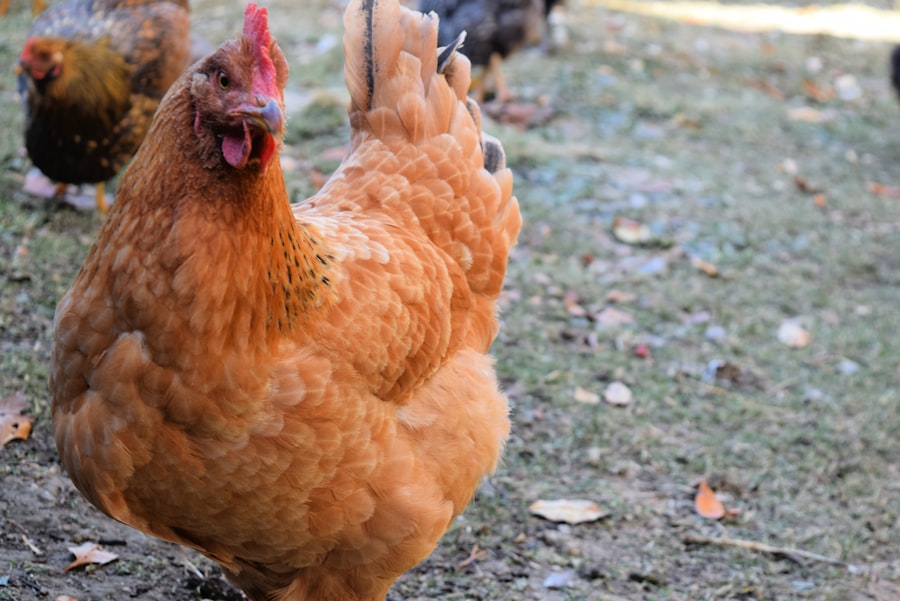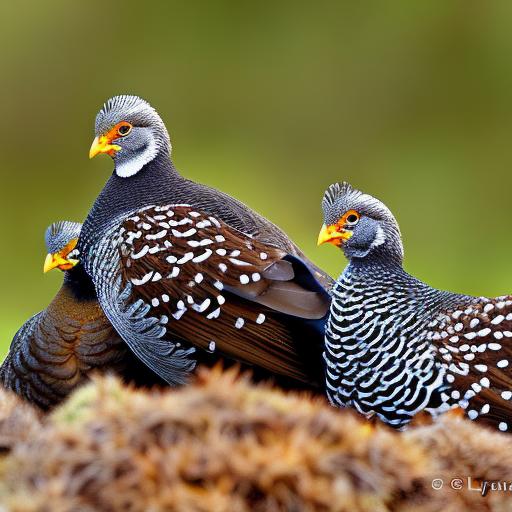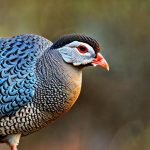Guinea fowl and Silkies are two popular poultry breeds that are often kept for their unique characteristics and benefits. Guinea fowl, also known as guineas, are native to Africa and are known for their distinctive appearance and loud calls. They are often kept for their ability to control pests such as ticks, flies, and other insects, making them valuable additions to a farm or homestead. Silkies, on the other hand, are a breed of chicken known for their fluffy plumage and gentle nature. They are often kept as pets or for their broody nature, making them excellent mothers for hatching and raising chicks.
Guinea fowl are known for their striking appearance, with speckled feathers and a helmet-like crest on their heads. They are also known for their loud calls, which can be a deterrent to predators and a source of annoyance to some keepers. However, their ability to control pests and their hardy nature make them valuable additions to a farm or homestead. Silkies, on the other hand, are known for their unique appearance, with fluffy plumage that feels like silk to the touch. They are also known for their gentle and docile nature, making them popular choices for families with children or as pets. Both guinea fowl and Silkies have their own unique characteristics and benefits, making them popular choices for poultry keepers.
Key Takeaways
- Guinea fowl and Silkies are popular poultry breeds known for their unique characteristics and behaviors.
- Proper housing for Guinea fowl and Silkies should include secure coops with ample space and protection from predators.
- Guinea fowl and Silkies require a balanced diet of high-quality feed, supplemented with fresh greens and insects for optimal health.
- Regular health checks, parasite control, and vaccination are essential for keeping Guinea fowl and Silkies in good condition.
- Careful management of interactions between Guinea fowl and Silkies is important to prevent aggression and ensure a harmonious flock dynamic.
Housing Requirements for Guinea Fowl and Silkies
Guinea fowl and Silkies have specific housing requirements that need to be met in order to keep them healthy and happy. Guinea fowl are known for their strong flying abilities, so it is important to provide them with a secure enclosure that is covered to prevent them from flying away. The enclosure should also have plenty of space for the guineas to roam and forage, as they are active birds that enjoy exploring their surroundings. Additionally, guinea fowl are social birds and should be kept in groups to prevent loneliness and stress.
Silkies, on the other hand, are not strong flyers and are more suited to being kept in a secure coop or run. Their fluffy plumage also makes them more susceptible to cold temperatures, so it is important to provide them with a draft-free and insulated coop during the winter months. Additionally, Silkies should be provided with nesting boxes for laying eggs and perches for roosting at night. Both guinea fowl and Silkies require protection from predators, so it is important to ensure that their housing is secure and predator-proof.
Feeding and Nutrition for Guinea Fowl and Silkies
Feeding and nutrition are important considerations when keeping guinea fowl and Silkies. Guinea fowl are omnivores and enjoy a varied diet that includes grains, seeds, insects, and vegetation. They are excellent foragers and will spend much of their time searching for food in the surrounding area. It is important to provide guinea fowl with access to a balanced poultry feed as well as supplemental treats such as mealworms, fruits, and vegetables. Additionally, providing access to grit is important for guinea fowl as it aids in digestion.
Silkies also require a balanced diet that includes a high-quality poultry feed as well as access to fresh water at all times. They enjoy scratching and pecking at the ground for insects and vegetation, so providing access to a run or outdoor area is beneficial for their mental and physical well-being. Additionally, Silkies should be provided with access to grit for digestion and supplemental treats such as fruits and vegetables. It is important to monitor the feeding habits of both guinea fowl and Silkies to ensure that they are receiving adequate nutrition for their needs.
Health Considerations for Keeping Guinea Fowl and Silkies
Keeping guinea fowl and Silkies healthy requires regular monitoring and attention to their health needs. Guinea fowl are generally hardy birds but can be susceptible to respiratory issues if kept in damp or poorly ventilated conditions. It is important to provide guinea fowl with a dry and well-ventilated housing environment to prevent respiratory issues. Additionally, regular health checks should be conducted to monitor for signs of illness or injury.
Silkies are known for their unique appearance, including feathered feet and crests, which can make them more susceptible to certain health issues. Their fluffy plumage can also make them more prone to mites and lice infestations, so regular checks for parasites are important for maintaining their health. Additionally, Silkies should be provided with dust baths to help keep their feathers clean and free from parasites. Both guinea fowl and Silkies should have access to clean water at all times to prevent dehydration and maintain overall health.
Managing Behavior and Interactions between Guinea Fowl and Silkies
Managing the behavior and interactions between guinea fowl and Silkies is important for maintaining a harmonious flock. Guinea fowl are social birds that thrive in groups, so it is important to provide them with plenty of space and opportunities for social interaction. They can be territorial at times, especially during the breeding season, so providing multiple feeding and watering stations can help reduce competition and aggression within the flock.
Silkies are known for their gentle nature and are often kept in mixed flocks with other poultry breeds. They are generally docile birds that get along well with other chickens, making them suitable companions for guinea fowl. However, it is important to monitor the interactions between different poultry breeds to ensure that there is no bullying or aggression within the flock. Providing plenty of space, enrichment, and opportunities for social interaction can help reduce stress and promote positive behavior within the flock.
Breeding and Rearing Young Guinea Fowl and Silkies

Breeding guinea fowl and Silkies requires careful planning and consideration of their specific breeding behaviors. Guinea fowl are known for their loud calls and complex mating rituals during the breeding season. It is important to provide guinea fowl with plenty of space and privacy for nesting in order to encourage successful breeding. Additionally, providing access to a balanced diet and supplemental calcium can help support successful egg production in female guineas.
Silkies are known for their broody nature and make excellent mothers for hatching and raising chicks. They are often used as surrogate mothers for hatching eggs from other poultry breeds due to their gentle nature and strong maternal instincts. It is important to provide broody Silkies with a quiet and secluded nesting area in order to encourage successful hatching and rearing of chicks. Additionally, providing access to a balanced diet and supplemental calcium can help support successful egg production in broody Silkies.
Conclusion and Tips for Successfully Keeping Guinea Fowl and Silkies
In conclusion, keeping guinea fowl and Silkies can be a rewarding experience for poultry keepers. Both breeds have unique characteristics and benefits that make them valuable additions to a farm or homestead. When keeping guinea fowl and Silkies, it is important to provide them with appropriate housing, feeding, health care, and social interaction in order to ensure their well-being.
Some tips for successfully keeping guinea fowl and Silkies include providing secure housing that meets their specific needs, offering a balanced diet with supplemental treats, conducting regular health checks, managing behavior and interactions within the flock, and carefully planning breeding and rearing young birds. By following these tips and providing attentive care, poultry keepers can enjoy the companionship of guinea fowl and Silkies while reaping the benefits of their unique characteristics on the farm or homestead.
If you’re considering keeping guinea fowl with silkies, you may also be interested in learning about the best ways to insulate your chicken coop. Proper insulation is crucial for maintaining a comfortable and healthy environment for your birds, especially during extreme weather conditions. Check out this informative article on how to insulate a chicken coop to ensure that your feathered friends stay cozy and protected throughout the year.
FAQs
Can guinea fowl and silkies be kept together?
Yes, guinea fowl and silkies can be kept together in the same coop or enclosure. However, it’s important to introduce them to each other gradually and monitor their interactions to ensure they get along.
Do guinea fowl and silkies get along?
In general, guinea fowl and silkies can get along well if they are introduced to each other properly and have enough space to coexist. It’s important to provide plenty of space and hiding spots for the silkies to avoid potential conflicts.
What are the benefits of keeping guinea fowl with silkies?
Keeping guinea fowl with silkies can provide benefits such as pest control, as guinea fowl are known for eating insects and ticks. Additionally, the two species can coexist peacefully and provide entertainment for the owner.
Are there any drawbacks to keeping guinea fowl with silkies?
One potential drawback of keeping guinea fowl with silkies is that guinea fowl can be noisy and may disturb the silkies, especially during mating season. Additionally, guinea fowl are known to be more aggressive and may bully the silkies if not given enough space.
What should I consider before keeping guinea fowl with silkies?
Before keeping guinea fowl with silkies, it’s important to consider the space available, the temperament of the individual birds, and the potential for noise and aggression. Providing ample space, hiding spots, and monitoring their interactions are crucial for successful cohabitation.
Meet Walter, the feathered-friend fanatic of Florida! Nestled in the sunshine state, Walter struts through life with his feathered companions, clucking his way to happiness. With a coop that’s fancier than a five-star hotel, he’s the Don Juan of the chicken world. When he’s not teaching his hens to do the cha-cha, you’ll find him in a heated debate with his prized rooster, Sir Clucks-a-Lot. Walter’s poultry passion is no yolk; he’s the sunny-side-up guy you never knew you needed in your flock of friends!







